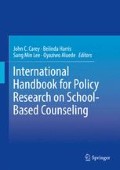Abstract
School-based counseling in South Korea has been rapidly growing over the last decade. Along with its growth, various issues have emerged from the inside of the field as well as from the outside. In this chapter, we briefly reviewed the existing context and policies of Korean school-based counseling and then discussed the policy research on school-based counseling in South Korea. This chapter focused on the following four major research themes: outcome research, the role of school counselors, ethical issues, and multicultural issues. Finally, key issues and implications of policy research in Korean school-based counseling were discussed.
Access this chapter
Tax calculation will be finalised at checkout
Purchases are for personal use only
References
Choi, S., Koh, Y., Park, J., Shin, Y., & Kang, M. (2012). A study on an ethical code for school counselors: Focused on suggestions for the new ethical code of the Korean school counseling association. The Journal of Counseling, 3(2), 505–525.
Gao, H., Hwang, M., & Kang, Y. (2010). The development of social skill group counseling program for ethnic minority children. The Korean Journal of Counseling, 18(2), 71–84.
Go, J., Yu, H., & Cho, Y. (2009). The development of a parents-involved group counseling program for preventing game addiction in elementary school students. The Korean Journal of Counseling, 10(3), 1663–1681.
Kang, J., Lee, J., & Son, H. (2007). An analysis of the school counselor’s ethical dilemmas and coping strategies. The Korea Journal of Youth Counseling, 15(1), 17–27.
Kang, J., Lee, J., Yu, H., & Son, H. (2007). An analysis of the school counselors’ education and awareness of ethical issues. The Korea Journal of Counseling, 8(2), 751–768.
Keum, M. J. (2007). Differences between expected and anticipated roles of the school counselors. Korean Journal of Counseling and Psychotherapy, 19(4), 843–861.
Kim, I. (2009). A study on the development plan of the professional school counselor system. The Korea Journal of Counseling, 10(1), 517–534.
Kim, H. D. (2013). Role comparisons between school counselors and career counselors. Seoul, Korea: Korean Educational Development Institute.
Kim, I., & Jo, N. (2010). Job analysis of school counselor using DACUM method. The Journal of Korean Teacher Education, 27(2), 97–115.
Kim, H. S., Yu, H. G., & Nam, S. I. (2014). Development of group counseling program for the ability of interpersonal relation of multicultural students of the higher grades of elementary school. Korean Journal of Teacher Education, 30(3), 177–195.
Kwon, Y., & Lee, J. (2011). Development of a classroom-based academic counseling program for academic development of elementary school students. The Korean Journal of Counseling, 12(6), 2177–2199.
Lee, S., & Lee, S. (2009). The effectiveness of adaptability program to school for lower grades students of elementary school in multicultural family. The Korean Journal of Counseling, 10(4), 2273–2286.
Lee, S. M., Oh, I. S., & Suh, S. H. (2007). Comparison study of Korean and American school counseling for developing a Korean school counseling model. Korean Journal of Counseling and Psychotherapy, 19(3), 539–567.
Lee, S. M., Suh, S., Yang, E., & Jang, Y. (2012a). History, current status, and future prospects of counseling in South Korea. Journal of Counseling and Development, 90(4), 494–499.
Lee, S. M., & Yang, E. (2008). School counseling in Korea: Historical development, current status, and prospects. Asian Journal of Counselling, 15(2), 157–181.
Ministry of Education. (2010). Research report on job and outcome analyses of school counselors. Seoul, Korea: Author.
Ministry of Public Administration and Security. (2015). Status of foreigners in South Korea [in Korean]. Seoul, Korea: Author.
Park, S., & Cheon, S. (2009). Development and application of a short-term school individual counseling model. The Korean Journal of Counseling, 10(1), 501–516.
Park, S., Yu, H., & Cho, Y. (2013). The development of a group counseling program to improve self-regulation competence of alternative high school students. The Korean Journal of Counseling, 14(2), 819–837.
Seo, Y. S., Kim, D. M., & Kim, D. I. (2007). Current status and prospects of Korean counseling psychology: Research, clinical training, and job placement. Applied Psychology. An International Review, 56(1), 107–118.
Song, H., & Kang, Y. (2011). From a homogeneous culture to a heterogeneous society: Implications of multicultural school counseling for children and adolescents. Journal of Asia Pacific Counseling, 1(2), 139–150.
Yu, Y. (2012). The effectiveness verification of career searching group counseling program for maladjusted middle school students. The Korean Journal of Youth Counseling, 20(2), 1–27.
Yu, K., Suh, S., & Lee, S. M. (2014). Strengths, weakness, opportunities, and threats (SWOT) analysis of school counseling in Korea. Journal of Asia Pacific Counseling, 4(2), 247–256.
Author information
Authors and Affiliations
Corresponding author
Editor information
Editors and Affiliations
Rights and permissions
Copyright information
© 2017 Springer International Publishing AG
About this chapter
Cite this chapter
Lee, S.M., Yang, N. (2017). School-Based Counseling Policy, Policy Research, and Implications: Findings from South Korea. In: Carey, J., Harris, B., Lee, S., Aluede, O. (eds) International Handbook for Policy Research on School-Based Counseling. Springer, Cham. https://doi.org/10.1007/978-3-319-58179-8_19
Download citation
DOI: https://doi.org/10.1007/978-3-319-58179-8_19
Published:
Publisher Name: Springer, Cham
Print ISBN: 978-3-319-58177-4
Online ISBN: 978-3-319-58179-8
eBook Packages: Behavioral Science and PsychologyBehavioral Science and Psychology (R0)

